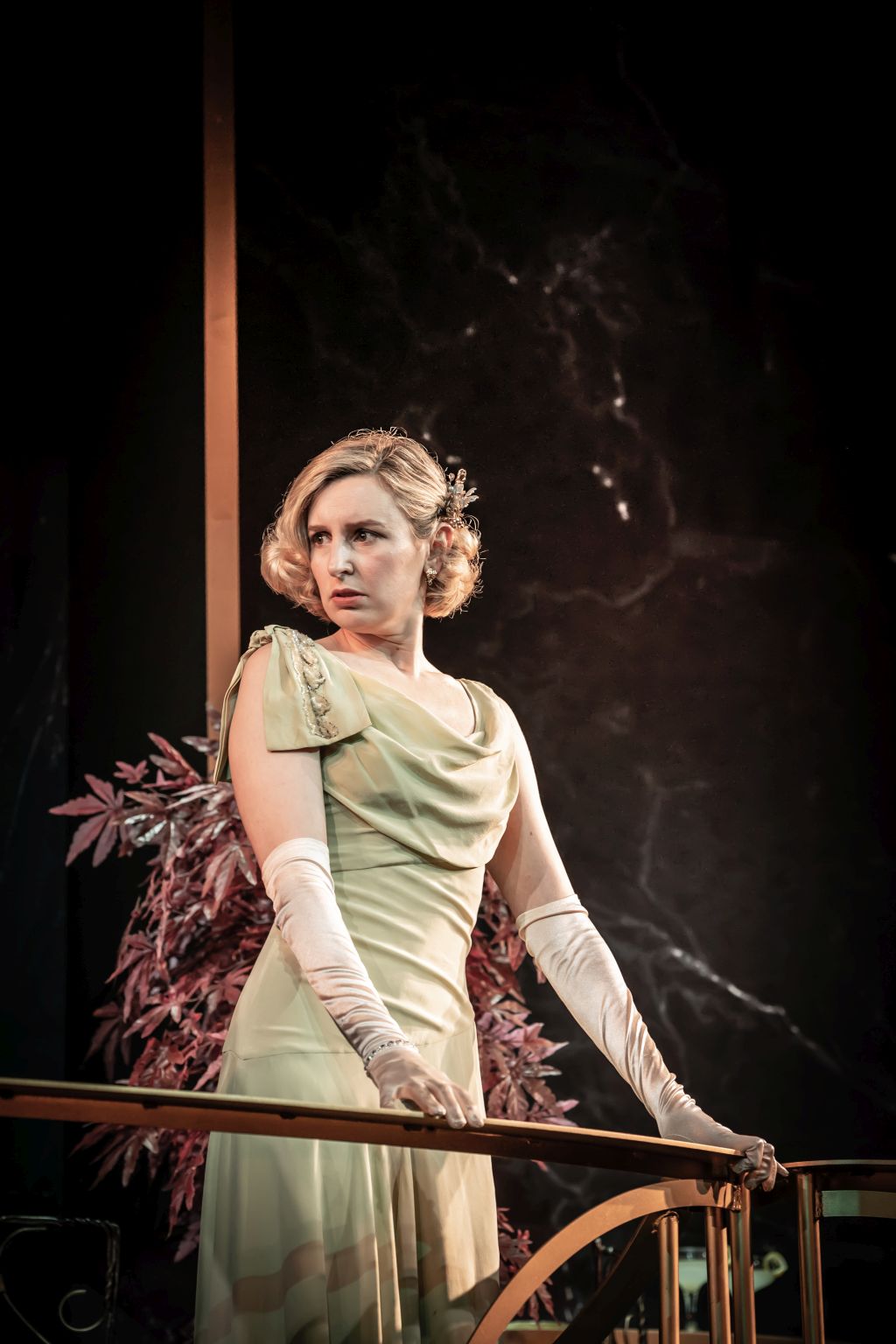Private Lives, Donmar Warehouse review - Coward revival cuts to the quick | reviews, news & interviews
Private Lives, Donmar Warehouse review - Coward revival cuts to the quick
Private Lives, Donmar Warehouse review - Coward revival cuts to the quick
Comedy classic plays up the pain that comes with pleasure

It's not often with Private Lives that you feel Amanda and Elyot are one step away from a visit to A&E. But such is the startling force of Michael Longhurst's Donmar Warehouse revival of arguably Noël Coward's most durable play that you are aware throughout of violence and pain as the flipside of passion at its most intense.
After all, not for nothing is this play remembered in some quarters for Elyot's casual remark that "certain women should be struck regularly, like gongs" - an eye-opening assertion whether now or in 1930, when Coward's three-act, four-character play premiered. Small wonder that we hear Elyot (Stephen Mangan) railing against his ex-wife Amanda (Rachael Stirling) as "a spiteful little beast" whom she divorced "for cruelty", as Elyot explains early on to Sibyl (a dismayed Laura Carmichael, pictured below), his younger second wife.
It's hardly surprising elsewhere to see Elyot stroking Amanda's throat in an apparent caress that could well morph into a choke. And when Amanda announces that she's "marked for tragedy", the comment in this context sounds far less flagrantly self-dramatising than usual: maybe she really is, and Elyot, too.
 I admit to some apprehension when I first saw Hildegard Bechtler's funereal-seeming set, which shrouds the Gallic setting in darkness at odds with the airiness of the opening balcony scene. That of course is the great coincidence that finds the one-time couple occupying adjoining suites on the French Riviera whilst on their second honeymoons. A throaty Stirling, in a career-best performance, gives Amanda a strangulated quality of surprise as befits someone experiencing a kind of PTSD, and Mangan invests Elyot with a corresponding growl to suggest a possible beast in the sheets - and possibly in life, as well.
I admit to some apprehension when I first saw Hildegard Bechtler's funereal-seeming set, which shrouds the Gallic setting in darkness at odds with the airiness of the opening balcony scene. That of course is the great coincidence that finds the one-time couple occupying adjoining suites on the French Riviera whilst on their second honeymoons. A throaty Stirling, in a career-best performance, gives Amanda a strangulated quality of surprise as befits someone experiencing a kind of PTSD, and Mangan invests Elyot with a corresponding growl to suggest a possible beast in the sheets - and possibly in life, as well.
Those wanting a more epicene take on this play may wonder at the sheer physicality of a staging in which the fights properly register: Kate Waters, no stranger to making theatrical agons matter, is the expert fight director here. But it's equally possible to view the production as a darker version of the defining West End and Broadway one from 20 years ago with Lindsay Duncan and Alan Rickman, in which this comedy of manners communicated an erotic ache that, in Longhurst's approach, tilts towards asphyxiation. Why do these lovebirds submit to one another again? Because some attractions defy analysis and, in any case, each is a lot wittier and more wild than the comparative dullards for whom they have none-too-happily settled second time round. Adventure, whatever the course, is preferable to domestic boredom.
It helps, too, to have two leads who understand the requisite style which a lot of younger performers these days play-act in an attempt to achieve but not here. Stirling looks terrific, hair styled with the same casual elegance with which she wears the period-perfect clothes. You sense Amanda's insecurity at "crumbling away unwanted", and when she quotes Saint Joan ("how long, O Lord, how long"), you feel anew the depth to a character far too essentially devoted to flippancy to succumb for good to the Shavian-Strindbergian abyss teased out by Coward. (In fact, I've often thought this play could be neatly done in repertory with Albee's Who's Afraid of Virginia Woolf?, a later theatrical quartet whose film leads, Richard Burton and Elizabeth Taylor, led a Broadway revival of Private Lives back in the day.)
Mangan is more physically robust than most Elyots in my experience, and you understand why Amanda would return to him in an instant, not least after that comparative wimp, Victor (Sargon Yelda), who seems here to have been cast for his physical slightness: Amanda looks as if she could eat this second husband for lunch whereas Elyot is another matter altogether. In roaring form, Mangan is very funny imitating the "plop plop"s of the fountain by the Plaza Athénée, and has a field day with an extended scene in which he devours a brioche with butter and jam: the man has a voracious appetite, which can be both an asset in life - and also not.
The supporting characters seem more strait-laced than usual (no Sibyl will ever rival Sara Crowe's scene-stealing turn in that part opposite Joan Collins), and when they turn on one another in the final scene, you share Amanda and Elyot's bemusement at their second partners' sheer ordinariness: if you're going to cut to the quick, at least do it with cunning. Will Amanda and Elyot find a new way forward that their temperaments disallowed first time round? Coward leaves that question to linger open-ended, but even if the duo do go down fighting, they will have done so as a couple: the togetherness is all.
The future of Arts Journalism
You can stop theartsdesk.com closing!
We urgently need financing to survive. Our fundraising drive has thus far raised £49,000 but we need to reach £100,000 or we will be forced to close. Please contribute here: https://gofund.me/c3f6033d
And if you can forward this information to anyone who might assist, we’d be grateful.

Subscribe to theartsdesk.com
Thank you for continuing to read our work on theartsdesk.com. For unlimited access to every article in its entirety, including our archive of more than 15,000 pieces, we're asking for £5 per month or £40 per year. We feel it's a very good deal, and hope you do too.
To take a subscription now simply click here.
And if you're looking for that extra gift for a friend or family member, why not treat them to a theartsdesk.com gift subscription?
more Theatre
 Troilus and Cressida, Globe Theatre review - a 'problem play' with added problems
Raucous and carnivalesque, but also ugly and incomprehensible
Troilus and Cressida, Globe Theatre review - a 'problem play' with added problems
Raucous and carnivalesque, but also ugly and incomprehensible
 Clarkston, Trafalgar Theatre review - two lads on a road to nowhere
Netflix star, Joe Locke, is the selling point of a production that needs one
Clarkston, Trafalgar Theatre review - two lads on a road to nowhere
Netflix star, Joe Locke, is the selling point of a production that needs one
 Ghost Stories, Peacock Theatre review - spirited staging but short on scares
Impressive spectacle saves an ageing show in an unsuitable venue
Ghost Stories, Peacock Theatre review - spirited staging but short on scares
Impressive spectacle saves an ageing show in an unsuitable venue
 Hamlet, National Theatre review - turning tragedy to comedy is no joke
Hiran Abeyeskera’s childlike prince falls flat in a mixed production
Hamlet, National Theatre review - turning tragedy to comedy is no joke
Hiran Abeyeskera’s childlike prince falls flat in a mixed production
 Rohtko, Barbican review - postmodern meditation on fake and authentic art is less than the sum of its parts
Łukasz Twarkowski's production dazzles without illuminating
Rohtko, Barbican review - postmodern meditation on fake and authentic art is less than the sum of its parts
Łukasz Twarkowski's production dazzles without illuminating
 Lee, Park Theatre review - Lee Krasner looks back on her life as an artist
Informative and interesting, the play's format limits its potential
Lee, Park Theatre review - Lee Krasner looks back on her life as an artist
Informative and interesting, the play's format limits its potential
 Measure for Measure, RSC, Stratford review - 'problem play' has no problem with relevance
Shakespeare, in this adaptation, is at his most perceptive
Measure for Measure, RSC, Stratford review - 'problem play' has no problem with relevance
Shakespeare, in this adaptation, is at his most perceptive
 The Importance of Being Earnest, Noël Coward Theatre review - dazzling and delightful queer fest
West End transfer of National Theatre hit stars Stephen Fry and Olly Alexander
The Importance of Being Earnest, Noël Coward Theatre review - dazzling and delightful queer fest
West End transfer of National Theatre hit stars Stephen Fry and Olly Alexander
 Get Down Tonight, Charing Cross Theatre review - glitz and hits from the 70s
If you love the songs of KC and the Sunshine Band, Please Do Go!
Get Down Tonight, Charing Cross Theatre review - glitz and hits from the 70s
If you love the songs of KC and the Sunshine Band, Please Do Go!
 Punch, Apollo Theatre review - powerful play about the strength of redemption
James Graham's play transfixes the audience at every stage
Punch, Apollo Theatre review - powerful play about the strength of redemption
James Graham's play transfixes the audience at every stage
 The Billionaire Inside Your Head, Hampstead Theatre review - a map of a man with OCD
Will Lord's promising debut burdens a fine cast with too much dialogue
The Billionaire Inside Your Head, Hampstead Theatre review - a map of a man with OCD
Will Lord's promising debut burdens a fine cast with too much dialogue

Add comment